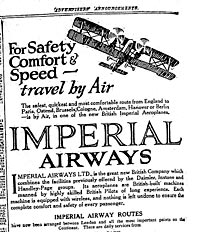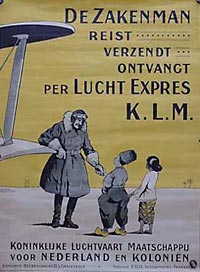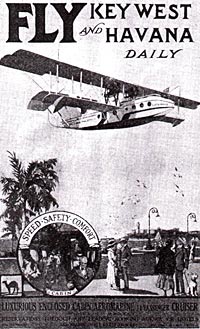An
Introduction to Airline Slogans
Misdirected corporate vanity or valid
marketing tools?
|
|
Offering speed, comfort
and regularity - until one sees this poster from probably the
1940s one might think the slogan is promoting a laxative rather
than an airline.
Part 1 of a series on
Airline Slogans - please
also visit the other pages linked on the right
|
Companies sometimes seem to
place too more time and effort into designing their
logo, letterhead, and slogan, while sometimes giving way too
little attention to
their business basics.
One has to wonder how much
airline resource goes into formulating their slogans, and how
much good it does them.
But, whether they are truly
useful or not for the airlines, they can sometimes be a source
of interest and unintended mirth for us.
Here we list the largest
airline slogan collection of anywhere on the internet.
What This List Comprises
On these pages we've
collated more than 560 different slogans, taglines, and other
brief advertising/promotional phrases from more than 200 airlines over the
world and over the
ages. We have airlines from all twenty six letters of the
alphabet, from all continents, and from all eras of aviation.
The earliest airline slogan?
The earliest slogan that can be
accurately dated is a Delta slogan from 1929 ("Speed, Comfort
and Safety"). Interestingly, that slogan was replaced only
a few years later by a new slogan "Speed, Comfort and
Convenience" and since that time, we've found only one
other
reference to safety, even though the industry has become
extremely safe.
 Update
- here now is a copy of an advertisement from London's Daily
Mail of 5 June, 1926 (click on thumbnail for a larger complete
image). Update
- here now is a copy of an advertisement from London's Daily
Mail of 5 June, 1926 (click on thumbnail for a larger complete
image).
It is debatable if the
phrase at the top - "For Safety, Comfort & Speed - travel by
Air" is indeed a slogan or not, but being as how it is from
1926, we'll give it the benefit of the doubt and name this, to
date, the earliest slogan we've found. (Thanks to Brett
Holman of
airminded.org for locating this image.)
There are of course earlier
slogans than this, but this is the earliest one we have yet
sighted.
 Update
- now here's a poster that may well be the truly very oldest
airline advertisement ever. It dates back to 1919, well
before most airlines had started flying. As you can
probably tell, it is promoting KLM, and I've consensus
translated the text (based on the opinions of a number of native
and non-native Dutch speakers) to read Update
- now here's a poster that may well be the truly very oldest
airline advertisement ever. It dates back to 1919, well
before most airlines had started flying. As you can
probably tell, it is promoting KLM, and I've consensus
translated the text (based on the opinions of a number of native
and non-native Dutch speakers) to read
The Businessman
Travels....
Sends (mails)....
Receives....
per (with/via/by) Air Express
KLM
At the bottom it spells out
the name KLM (which means Royal Airline Company) and then says
for (of the) Netherlands and Colonies.
The reference to sending and
receiving almost certainly refers to airmail letters.
Planes back then were too small and too few for air freight
services.
 Update
: Here is one more old poster, relating to Aeromarine West
Indies Airways, a company that began the first scheduled
international passenger and airmail service in the US, starting
service between Key West and Havana on 1 November, 1920. Update
: Here is one more old poster, relating to Aeromarine West
Indies Airways, a company that began the first scheduled
international passenger and airmail service in the US, starting
service between Key West and Havana on 1 November, 1920.
The company is known to have
operated for some years in the early 1920s, and and ceased
operations in early 1924. So this poster is older than the
Delta poster, but not as old as the KLM poster.
Airline Safety in slogans
Back to safety issues,
little reference to safety has been made after
the brief lived Delta 1929 slogan that said "Speed, Comfort
and Safety" although there is also a coy
reference that hints at safety from Braniff in 1937 "2 engines,
2 way radio, 2 pilots, 2 rudders for smoother flying".
It is interesting to note
though that with the uncovering of these other two airline
posters and slogans, the three words 'speed, comfort, safety'
were being promoted by all airlines in the 1920s.
But beyond that, claims
about safety have been largely absent from airline slogans.
And when they have been implied rather than overtly stated,
their subsequent contradiction (in the form of a plane crash)
has sometimes had far reaching events.
In particular,
perhaps one of the reasons for the cessation of Concorde
services was the profound embarrassment Air France and British
Airways felt when the plane that they'd always, sotto voce,
lauded for being so incredibly safe and having a perfect safety
record (achieved as much by there being so few planes in service
with so few total flight hours accumulated) suffered such a
spectacularly visceral crash on take-off in Paris, captured so
vividly on video for the entire world to agonize over.
Other slogans have come from
just about every part of the evolution of the airline industry
in the 90+ years since this first dated slogan, which itself was
released less than ten years since the start of commercial air
services (ie shortly after World War 1, in about 1920 or
thereabouts).
Many Slogans are Very Similar
Note the similarity of both
these Delta slogans mentioned in the preceding section, taken
from 1929 and then some time in the 1930s, to the slogan seen on
an ANA baggage tag in 1936 and printed on a Pan Am ticket in
1939 and then to the
New Zealand airline poster pictured at the top, taken from
either the 1940s or early 1950s.
And all of these date back
to the advertisement above from 1926.
The original "Safety,
Comfort & Speed" becomes "Speed, Comfort and
Safety" then "Speed, Comfort and Convenience",
then becomes "Speed Safety Comfort" in Australia in 1936, then
"Speed - Comfort - Dependability" with Pan Am
and then reappears as "Speed,
Comfort and Regularity" in New Zealand.
For another example, compare Air India's
slogan 'Your Palace in the Sky' with Air Pacific's "Your Island
in the Sky", Biman Bangladesh Airlines' "Your Home in the Air"
and even Air New Zealand's "The Ritz of the Skies".
Great minds think alike (or fools seldom differ)?
Coincidence or copying?
Public and Private Battles of
Words
Sometimes these similarities
have occasioned friction between carriers (for example,
Lufthansa felt that BA's slogan "The Way to Fly" was too similar
to its long standing slogan "There's No Better Way to Fly").
Perhaps the similarities are
sometimes accidental, and perhaps sometimes they are unavoidable
(there are, after all, only so many ways to promote very similar
concepts in a small number of words), but there are also times
when one airline will directly choose a slogan to poke fun at
other airlines, either as an 'insider joke' (such things can
infuriate one airline's board room while delighting another, in
a manner rather reminiscent to juvenile school boys calling each
other names) or as an obvious public jibe.
Consider, for example, Hawaiian Airlines tilt at its
competitors "Only One Airline is Hawaiian" (which
refers only to its name rather than its ownership or base of
operations). You'll find
other examples as you read through the slogan pages.
Two Engines or Four?
Sir Richard Branson's chosen
iconoclastic persona is well displayed by some of the slogans
adopted by his Virgin Atlantic Airways airline (such as "4
Engines 4 Longhaul" - touting what was hinted at being a greater
safety/reliability of the Virgin four engined planes (747 and
A340) compared to competitors with two engined planes (eg 767
and 777).
There's an interesting
further twist to the Virgin slogan. Back in the late
1930s, Imperial Airways (an antecedent of British Airways, the
arch-competitor of Virgin's) had two slogans it was using - "4
Engines for Security" and "Four Engined Air Liners" - meaning
that BA had now reversed position from promoting four engines to
now being tweaked by another airline that preferred/promoted
four engines.
This tale continues.
In mid 2009, Virgin Atlantic announced that it would start
flying some long-haul routes using twin engined planes.
Its earlier slogan is now being quietly forgotten about.
The Evolution of Slogans
We can see, by derivation,
some of the evolution of the airline industry through the
slogans it chooses to use, as well as of course needing to
appreciate the slogans in the social context of the time in
which they were created.
Discussed earlier was the
fleeting reference to safety. Other casualties of time
have been promises of on-time reliability, and even speed -
another surprising omission in an industry which, on the face of
it, has been offering increasingly fast transportation over the
decades (a DC3 cruised at 150 mph with a typical range of under
1500 miles, a modern jet can cruise almost four times faster and
up to six times further).
Some styles have evolved,
others have revolved. Slogans have gone from short to long and back to
short again. Racy slogans with double entendres were
popular for a while around the 1970s, but no longer are as
popular.
Product and feature based
slogans have largely disappeared as well - perhaps because the
airlines nowadays have very little to boast about. Instead
we have empty and meaningless slogans that mirror the emptiness
of the airlines themselves - what does "Good Goes Around" mean,
for example (other than being an unfortunate 'insider' joke - a
'Go Around' in pilot parlance refers to an aborted landing -
something that is never desirable and seldom good).
Evolution as improvement
We also see slogans that
evolve in a sense of improving on the earlier slogan.
Sometimes a word or two will be removed to 'tighten up' a slogan
or make it more meaningful and impactful.
Other times, a slogan is
simply improved upon, like for example Wien Air Alaska and their
substitution of "Alaska's First Airline" for the earlier slogan,
"Alaska's Oldest Airline". Being thought of as the
original or first airline is perhaps a good thing, but being
thought of as old is probably not such a good thing - this was
clearly a positive evolution in slogan.
Product/Feature vs Benefit
Slogans
A basic tenet of marketing
is that you express the features of your product in terms of
benefits to the person who may buy the product. For
example, rather than advertising 'our airline arrives as scheduled
95% of the time' you might advertise 'you can rely on our airline and
plan your itinerary with confidence'; instead of offering 'more
generous seat spacing' you'd promote 'more room to stretch out in',
and so on.
You'll see some of these
slogans are strongly product/feature oriented - perhaps
reflecting the mindset of the earlier airline managers, who
tended to come from a military or engineering background.
But as the products and features erode in value, you'll see
slogans talking more about benefits, and as even the benefits
too erode, slogans start to concentrate more on meaningless
statements that are offered as 'feel good' concepts.
In
truth, the greatest amount of 'feel good' sensation these offer
is probably at the advertising agencies generating huge fees for
such 'branding and positioning statements' and the boardrooms of
the airlines where the directors and senior officers feel good
about having a new tag line to boast of. As for those of
us who read the slogans and fly the planes, the slogans are
meaningless. Which airline would you choose - the airline
that says "It's time to fly" or the airline that says "Flying
through the air" - of course, neither slogan has any sense or
value to us at all.
Slogans to Achieve a Specific
Objective
Sometimes an airline will
launch a new slogan because of some change or new feature.
The purchase or upgrade of
planes, adding new routes, or buying out/merging with another
airline are all examples of these types of slogans.
This can be a good use of a
slogan - another way to register a particular point with
readers/listeners/viewers.
Part 1 of a series on
Airline Slogans - please
also visit the other pages linked at the top
right of this article.
Related Articles, etc
|
If so, please donate to keep the website free and fund the addition of more articles like this. Any help is most appreciated - simply click below to securely send a contribution through a credit card and Paypal.
|
Originally published
21 Aug 2009, last update
30 May 2021
You may freely reproduce or distribute this article for noncommercial purposes as long as you give credit to me as original writer.
|

